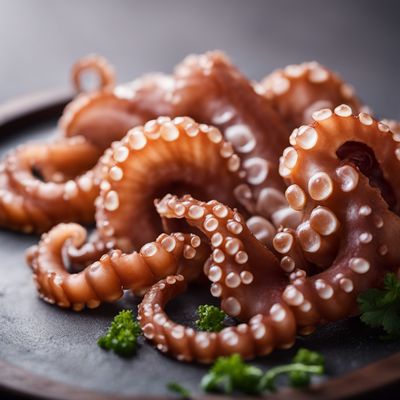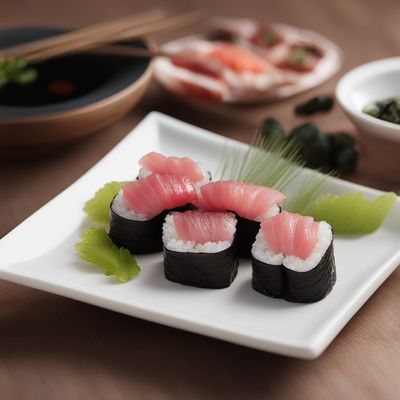
Ingredient
Octopus, musky
The Ocean's Delicacy
Octopus is a cephalopod mollusk known for its tender yet chewy texture and delicate flavor. With its long tentacles and distinctive appearance, octopus is a versatile ingredient that can be enjoyed in various dishes, from grilled octopus to octopus salad.
Origins and history
Octopus has a rich history in Mediterranean and Asian cuisines, where it has been consumed for centuries. It holds cultural significance in countries like Greece, Spain, Japan, and Korea. Octopus fishing and consumption have deep-rooted traditions in these regions.
Nutritional information
Octopus is a low-calorie, high-protein ingredient that also provides essential vitamins and minerals such as vitamin B12, selenium, and iron. It is also a good source of omega-3 fatty acids, which are beneficial for heart health.
Allergens
Octopus is not a common allergen, but individuals with shellfish allergies may also be allergic to octopus. It is important to exercise caution and consult with a healthcare professional if you have any concerns.
How to select
When selecting octopus, look for specimens with firm, intact flesh and a fresh, briny smell. Avoid octopus that has a slimy texture or a strong fishy odor, as these are signs of spoilage. Fresh octopus should have a vibrant color and be free from any discoloration or blemishes.
Storage recommendations
To maintain the freshness of octopus, store it in the refrigerator at a temperature between 32°F and 39°F (0°C and 4°C). Keep it wrapped in a damp cloth or paper towel to prevent it from drying out. Consume it within 1-2 days of purchase for optimal quality.
How to produce
Octopus can be challenging to produce at home due to its specific habitat requirements and complex life cycle. It is best to leave the cultivation and harvesting of octopus to professional fishermen and suppliers who have the necessary expertise and equipment.
Preparation tips
Octopus can be prepared in various ways, including grilling, boiling, braising, or marinating. Tenderize the octopus by simmering it in water with aromatics such as bay leaves, garlic, and lemon juice before cooking. For grilling, brush the octopus with olive oil and season it with salt and pepper before charring it over high heat. Serve octopus in salads, pasta dishes, or as a standalone appetizer.
Substitutions
Squid can be used as a substitute for octopus, as they both belong to the same family of cephalopods. Squid has a similar texture and flavor, although it may be slightly milder. Another option is using cooked shrimp, which can provide a similar seafood taste and texture.
Culinary uses
Octopus is widely used in Mediterranean cuisine, where it is featured in dishes like octopus carpaccio, octopus stew, and grilled octopus with lemon and herbs. In Japanese cuisine, octopus is a key ingredient in takoyaki (octopus balls) and sushi. It is also popular in Korean cuisine, where it is enjoyed in dishes like nakji bokkeum (spicy stir-fried octopus) and sannakji (live octopus).
Availability
Octopus is commonly available in coastal regions around the world, including countries like Greece, Spain, Italy, Japan, Korea, and Portugal.


